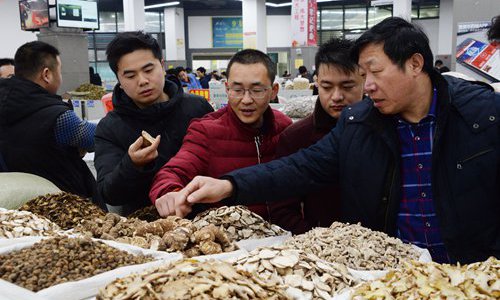HOME >> CHINA
Traditional Chinese medicine ready for expanding international market
By Sun Haoran Source:Global Times Published: 2019/5/26 19:58:40

Traders bargain inside the traditional Chinese medicine (TCM) market in Bozhou, East China's Anhui Province on Monday. The market reopened on Monday after the weeks-long Chinese Spring Festival holidays. The TCM market in Bozhou is said to be one of the most wide-ranging and active specialized markets for Chinese medicinal materials, with the market's annual sales standing at 30 billion yuan ($4.73 billion) in 2017. Photo: VCG
Chinese experts on Sunday hailed the World Health Organization's (WHO) formal approval of the inclusion of a chapter on traditional Chinese medicine (TCM) in the latest version of its influential global compendium.
"This is significant for the internationalization of TCM industry as it will help China establish a TCM disease statistics network linked to international standards," Liu Baoyan, president of the China Association of Acupuncture-Moxibustion, told the Global Times.
It would also promote the integration of TCM with the medical and health systems of countries around the world, Liu noted.
TCM is used in 183 countries and regions, the Xinhua News Agency reported.
Beijing has signed TCM cooperation agreements with more than 40 foreign governments, regions and organizations including the US, Russia, the UK, Germany, France, Canada and Italy.
Besides, a number of TCM centers have been established in countries and regions along the routes of China-proposed Belt and Road Initiative.
Countries such as Singapore and Thailand have partly or wholly legalized some TCM practices, Chinese media reports noted.
Students from India are the largest group studying at China Medical University, Diao Yefang, head of the teaching affairs office at the university's international education school, previously told the Global Times.
China has established intergovernmental mechanisms with South Korea, Singapore, and Malaysia.
The industry reaped more than 860 billion yuan ($130 billion) in 2016, and was growing at 20 percent annually, Xinhua reported, citing the State Administration of Traditional Chinese Medicine of China.
Meanwhile, the WHO's decision was not universally welcomed. Some foreign scientists questioned the safety of Chinese herbal medicines and the absence of double-blind evidence-based reports on its efficacy.
Animal rights advocates also warned that the decision would endanger animals such as tiger, pangolin, bear and rhino, whose organs were used in some TCM cures.
Even within China, critics worry that TCM can cause adverse drug reactions, of which the best-known issue was Houttuynia injections that killed at least 44 people. On June 1, 2006, China's State Food and Drug Administration temporarily suspended the use and approval of seven TCM injections including Houttuynia injections.
"Problems do exist in development of the TCM industry," Zhou Lihua, an expert with the AIDS research center at the Henan University of Traditional Chinese Medicine, told the Global Times on Sunday.
"However, TCM is based on more than 2,500 years of Chinese medical practice and has proven to be effective," Zhou said.
Newspaper headline: TCM ready for expanding international market
Posted in: SOCIETY